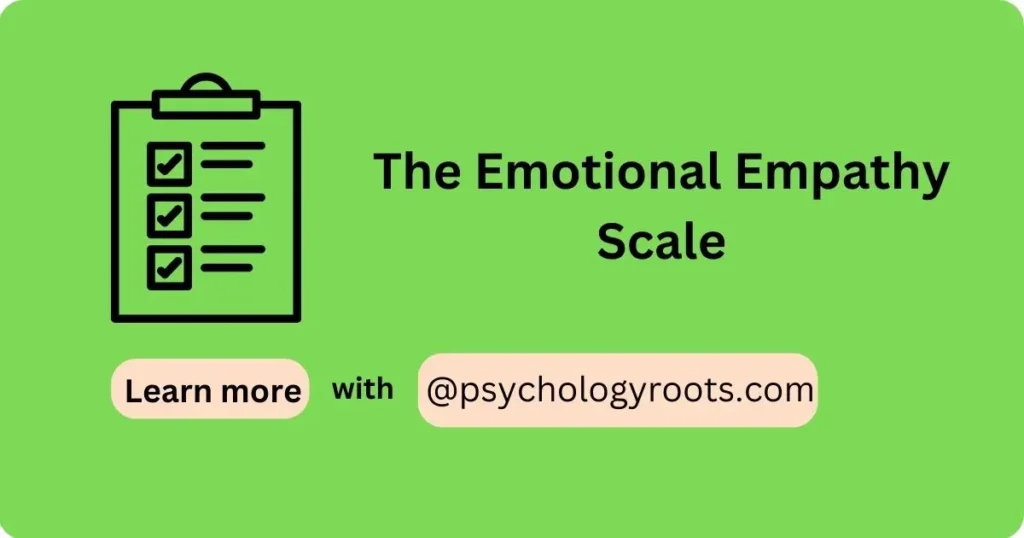Table of Contents
The Emotional Empathy Scale
Here in this post, we are sharing the “Emotional Empathy Scale”. You can read psychometric and Author information. We have thousands of Scales and questionnaires in our collection (See Scales and Questionnaires). You can demand us any scale and questionnaires related to psychology through our community, and we will provide you with a short time. Keep visiting Psychology Roots.
About Scale Name
Scale Name
The Emotional Empathy Scale
Author Details
Dr. Norman Epstein
Translation Availability
Not Sure

Background/Description
The Emotional Empathy Scale (EES) was developed by UCLA psychologists Albert Mehrabian and Norman Epstein in 1972. They conceptualized empathy as a vicarious emotional response to the emotional reactions of others1. The EES consists of 33 items that are rated on a 9-point Likert scale and yields one total score indicating an individual’s current capacity for empathy.
The EES has been widely used in research and clinical settings to assess empathy1. However, it is important to note that the authors of the EES do not have copyright authority over the scale and cannot grant permission for its use.
Administration, Scoring and Interpretation
The Emotional Empathy Scale (EES) developed by Dr. Norman Epstein and Dr. Albert Mehrabian consists of 33 items that are rated on a 9-point Likert scale. The EES yields one total score indicating an individual’s current capacity for empathy. The EES measures emotional empathy, which is the ability to experience and understand the emotions of others.
The first step is to reverse the score (9 = 1, 8 = 2, 7 = 3, 6 = 4, 5 = 5, 4 = 6, 3 = 7, 2 = 8, and 1 = 9) for the following items: 2, 3, 6, 11, 13, 15, 20, 21, 22, 23, 24, 28, 30, 32, and 33. Then add together your responses to the items.
Reliability and Validity
The Emotional Empathy Scale (EES) developed by Dr. Norman Epstein and Dr. Albert Mehrabian has been shown to have construct validity issues in that it was multidimensional at both the first- and second-order factor levels. However, Mehrabian and Epstein’s EES is a 33-item scale of emotional empathy that measures vicarious emotional arousal and empathic concern.
The EES yields one total score indicating an individual’s current capacity for empathy. The EES has been used in various studies and is available for use, but permission for use must be obtained as the authors hold the copyright. The reliability and validity of the EES have not been mentioned in the search results.
Available Versions
33-Items
Reference
Mehrabian, A., & Epstein, N. (1972). A measure of emotional empathy. Journal of Personality, 40, 525–543.
Important Link
Scale File:
Frequently Asked Questions
What is the Emotional Empathy Scale?
The Emotional Empathy Scale (EES) is a psychological assessment tool used to measure an individual’s level of emotional empathy.
Who developed the Emotional Empathy Scale?
The EES was developed by UCLA psychologists Albert Mehrabian and Norman Epstein in 1972.
How many items are there in the Emotional Empathy Scale?
The EES consists of 33 items that are rated on a 9-point Likert scale.
Is permission needed to use the Emotional Empathy Scale?
Yes, permission must be obtained as the authors hold the copyright.
Where can I find more information about the Emotional Empathy Scale?
You can refer to the original article “A measure of emotional empathy” by Mehrabian and Epstein published in the Journal of Personality (1972).
Disclaimer
Please note that Psychology Roots does not have the right to grant permission for the use of any psychological scales or assessments listed on its website. To use any scale or assessment, you must obtain permission directly from the author or translator of the tool. Psychology Roots provides information about various tools and their administration procedures, but it is your responsibility to obtain proper permissions before using any scale or assessment. If you need further information about an author’s contact details, please submit a query to the Psychology Roots team.
Help Us Improve This Article
Have you discovered an inaccuracy? We put out great effort to give accurate and scientifically trustworthy information to our readers. Please notify us if you discover any typographical or grammatical errors.
Make a comment. We acknowledge and appreciate your efforts.
If you have any scale or any material related to psychology kindly share it with us at psychologyroots@gmail.com. We help others on behalf of you.